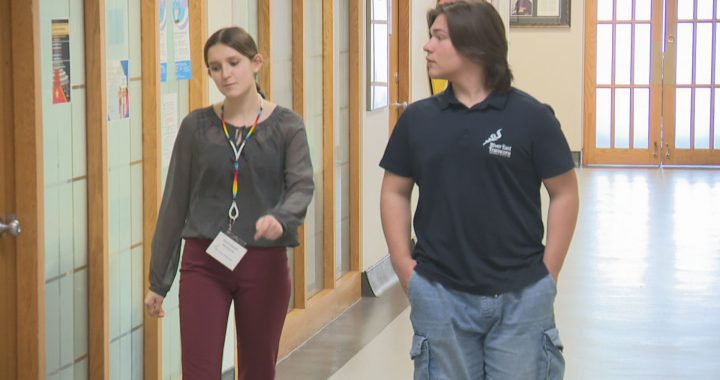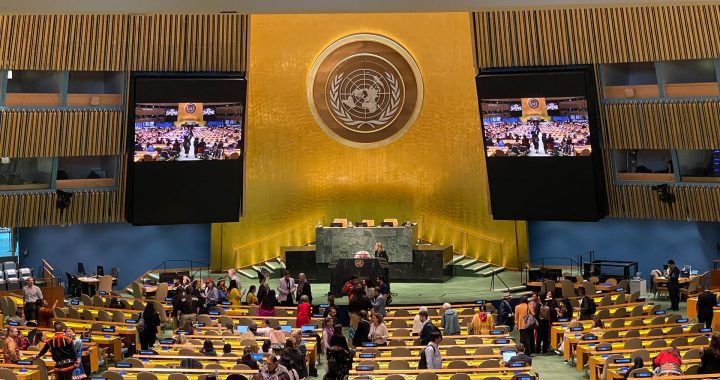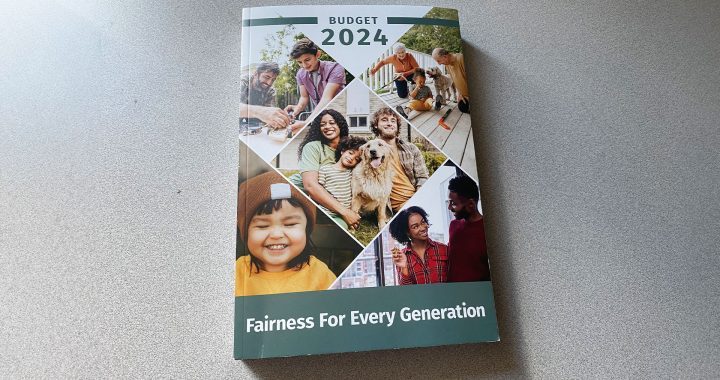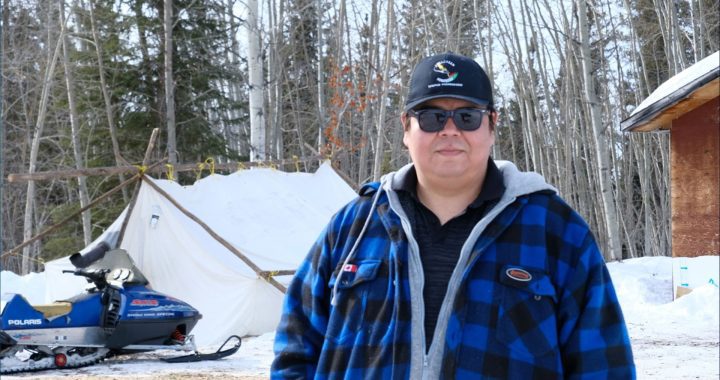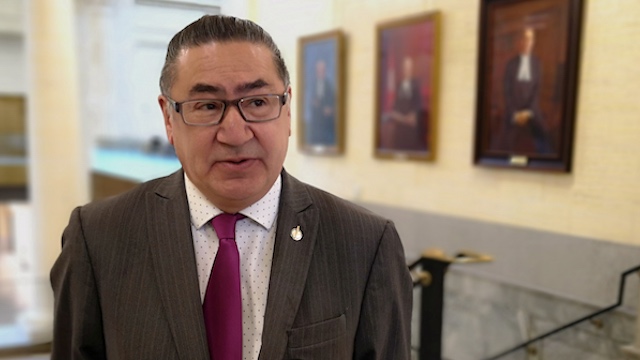
Romeo Saganash, a retired New Democrat MP. will go through a diversion program instead of court proceedings after being charged with sexual assault. Photo: APTN file
Romeo Saganash says he’s devastated that his private member’s bill C-262 has been left to die after making it to the final stage in Canada’s legislative process.
But the Cree MP from Waswanipi says he believes the fight for Indigenous peoples’ human rights is strengthening and that the United Nations Declaration on the Rights of Indigenous Peoples (UNDRIP) has a future in Canada.
“I am devastated and regret that my bill, that so many people have worked so hard to promote and educate on, will not become law,” Saganash, who, following two terms with the NDP is not running for re-election in this fall’s election, writes in a statement shared with APTN News Monday.
“Nonetheless, I have been inspired and reassured by the broad representation from civil society in the support for this bill: churches, labour unions, human rights organizations, environmental organizations, Indigenous leadership and grassroots that have made it possible to get to the recognition and respect that we see today.”
Saganash is speaking out just days after C-262, which represented his second attempt to have Canada align its laws with the global minimum human rights standards for Indigenous peoples, was left to die following weeks of intense opposition from Conservatives in the Senate.
Senators and MPs of the Conservative Party of Canada have expressed fears of economic and legal consequences if Canada were to align its laws with UNDRIP.
Last Wednesday, after it became apparent that Conservative efforts to prevent a third and final reading in the Senate for C-262 would be successful, the government’s representative in the Senate, Peter Harder, announced the Liberals would once again campaign on a promise to legislate UNDRIP if re-elected in the fall.
In 2015 Justin Trudeau promised that, if elected prime minister, he would “enact the recommendations of the Truth and Reconciliation Commission, starting with the implementation of the United Nations Declaration on the Rights of Indigenous Peoples.”
Harder’s statement came one day after the prime minister announced his government’s new approval of the Trans Mountain pipeline expansion (TMX), which, if built, would run through unceded First Nations’ territories without consent from rights and title holders.
“The Government of Canada will thereby intend to bring forward legislation introducing UNDRIP and ensuring its expeditious consideration, review and passage,” Harder said in the Senate. “Introducing government legislation to implement UNDRIP will be a platform commitment that Canadians will be able to vote on in the election in October.”
The Green Party and NDP have already made the same commitment. But it’s the fact that the Liberals campaigned on the very same promise four years ago that has some upset, considering a legislated UNDRIP could have preceded a number of controversial Liberal legislative and policy changes critics say ignore the very rights declared in the UN Declaration.
Niki Ashton, the NDP’s Deputy Critic for Reconciliation, told APTN Thursday the Liberals could have adopted C-262 as a government bill, which would have given it priority in the Senate over private members’ bills.
“This is not what reconciliation looks like, whether it’s support of [TMX] or whether it’s the delays and lack of political will to speed things up with respect to the UN Declaration on the Rights of Indigenous Peoples,” she said.
On Thursday, Crown-Indigenous Relations Minister Carolyn Bennett told APTN it was due to the Conservatives’ “partisan games” that C-262 was at risk of being lost.
“I think that everybody had huge respect for Romeo Saganash, the work that he put into his bill, and we had every understanding that this would pass,” Bennett said.
“We supported it in the House and in committee, and I think that’s what’s so disappointing — that this bill would have been Romeo Saganash’s legacy, after all the work he did in New York at the UN for decades.”
At the centre of the Conservatives’ opposition to the bill is a fear over the principle of “free, prior and informed consent” (FPIC).
FPIC is a cornerstone of the UN Declaration, but one that has some prioritizing Canadians’ economic interests over Indigenous peoples’ basic human rights due to concerns consent could mean Indigenous peoples would have the right to say no to resource development projects that could negatively impact them.
“No one seems to know” the implications of UNDRIP being legislated, Conservative Senator Don Plett said in the Senate last month, “because there is no agreement on whether consent means a veto.”
It’s a false dichotomy though, Independent Senator Murray Sinclair, Saganash and others have repeatedly told C-262’s critics.
“Free, prior and informed consent is a very simple concept,” Sinclair told APTN in May. “And that is, before you affect my land, you need to talk to me, and you need to have my permission.
“That doesn’t mean that we’re vetoing it. It doesn’t mean that First Nations people, or Indigenous people outside of Indian reserves, are vetoing anything. Just because they say you can’t run a pipeline across my land doesn’t mean you can’t run it somewhere else.”
Without having their free, prior and informed consent respected and observed, Indigenous peoples find themselves in positions like the Tsleil-Waututh and Secwepemc in British Columbia, who argue their people have not consented to the TMX running through their territories, nor to the associated risks.
Last year a Federal Court of Appeal decision quashed the National Energy Board’s approval of the TMX due in part, the court ruled, to Canada’s failure to fulfill its duty to consult with First Nations who stand to be impacted by the pipeline, which would triple the current movement of diluted bitumen from the Alberta oil sands to the B.C. coast.
Last Tuesday Trudeau announced the TMX would be built, with shovels in the ground as early as this summer.
The prime minister said Natural Resources Minister Amarjeet Sohi had “personally met with over 65 Indigenous groups across 46 meetings” since the renewed consultation process was ordered, and that government “listened to community concerns” and is “acting on community ideas.”
Trudeau and Sohi said they would continue dialogue with First Nations and work to accommodate their concerns and wishes.
But some nations are firm in their rejection of the pipeline.
Following Tuesday’s TMX announcement, Tsleil-Waututh Nation Chief Leah George-Wilson promised further legal action against Canada.
Last year the feds, under the leadership of former justice minister and attorney general Jody Wilson-Raybould, announced their 10 “principles respecting the Government of Canada’s relationship with Indigenous peoples.”
One of those principles states Canada “recognizes that meaningful engagement with Indigenous peoples aims to secure their free, prior, and informed consent when Canada proposes to take actions which impact them and their rights, including their lands, territories and resources.”
Asked by APTN on Tuesday for the definition of free, prior and informed consent that was applied to the TMX decision, Trudeau responded that it is “what we engaged in doing with Indigenous communities over the past number of months.
“It is engaging, looking with them, listening to the issues they have, and responding meaningfully to the concerns they have wherever possible.”
Some First Nations leaders have responded to the TMX announcement, saying consent means respecting their people’s right to say no to something that could harm them.
Bennett said Thursday that while the UN Declaration hasn’t been legislated as a “totality,” the Liberals “have enshrined parts of UNDRIP” into Bills C-91 and C-92, the Indigenous Languages Act and child welfare legislation, which both received royal assent last week.
“This is the new way of doing business,” she said.
“How we take each of those very significant articles [of UNDRIP] and make sure that we as Canada are actually implementing this very important international document?”
Last month on Nation to Nation, Saganash said the government’s failure to pass C-262 “probably will be the most disappointing fact in my life.”
When he testified before the Aboriginal Peoples Senate committee in May, he recounted the two goals he set for himself after coming out of residential school in the 1970s.
“One of them was to go back to the bush, live off the land, which I did for two years,” he told the committee.
“But importantly, perhaps, was the promise to reconcile with the people who put me away for 10 years. And Bill C-262 represents that reconciliation for me.”
In his statement on Monday, Saganash describes the nature of the fight for Indigenous peoples’ human rights.
“The struggle for human rights is a long one; it takes us away from our families and loved ones; we work too many hours, we sacrifice our health and spirit. Yet our ancestors took a path before me, one that is for dignity, justice and a good life,” he writes.
“Others have not only followed the path but imagined new possibilities. I am grateful for the sacrifices they also have made in the belief that Indigenous law, rights, and ways of being will…one day be restored to these territories. I am honoured to follow in their work, and I dedicate any accomplishments I have made to my family.”
In 2015 the Truth and Reconciliation Commission compelled Canada to implement the U.N. Declaration “as the framework for reconciliation.”
Saganash says in his letter he remains “strongly convinced of the potential” for this to happen, “as a set of standards created by Indigenous peoples for Indigenous peoples, and as a reminder to nation-states like Canada, that we are still here, and we not only deserve but we demand the rights that have been denied us for so long.
“There are and always have been obvious flaws in a governing system that is designed to maintain a status quo and deny rights to people who power rejects,” Saganash writes.
“The process of bringing C-262 along the legislative path has highlighted this for me and I believe there are many parts in this struggle and many people lead; it’s not enough to create legislation that holds the colonial governments accountable to International human rights standards and to Indigenous ways of being; it will take structural and institutional change in order to see justice on stolen lands.
“Let us rise with more energy. Let us stand with a greater determination. On behalf of the millions who are building resistance and beauty in our communities: our spirit is not broken.”






